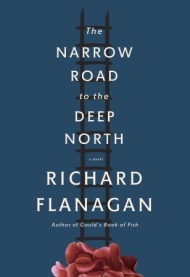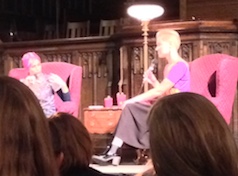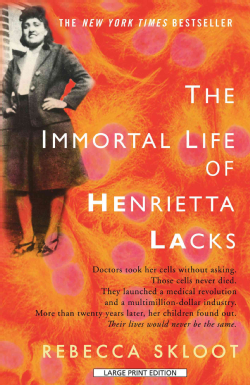
It’s been a busy past week in book-related news. First off, congratulations to Tasmanian author Richard Flanagan for winning the 2014 Man Booker Prize for Fiction for his novel “The Narrow Road to the Deep North.” Like Eric Lomax’s memoir “The Railway Man,” which I read and reviewed earlier this year, Flanagan’s book is about a prisoner-of-war working on the Thailand-Burma “Death” railway in WWII. The main character is an Australian surgeon whose life is a daily struggle to save the men under his command. The novel’s inspired by Flanagan’s father’s experiences as a Japanese prisoner-of-war at a camp where 14,000 died. I know I’ll want to read “The Narrow Road,” but I still have another scary P.O.W. book to read first … “Unbroken” by Laura Hillenbrand. Need I say more? The film opens at Christmas.
Meanwhile our city’s annual book festival, Wordfest, has been going on this week, and as usual it’s been great hearing authors do readings and interviews about their latest books. I’ve been attending an event each evening and so far have heard Emma Donoghue (“Frog Music”), Damon Galgut (“Arctic Summer”), Tahereh Mafi (“Shatter Me” series), Veronica Roth (“Divergent” series), Padma Viswanathan (“The Ever After of Ashwin Rao”), Alison Pick (“Between Gods”), and Miriam Toews (“All My Puny Sorrows”). Some of these authors’ works I’ve known and others I have not, but hearing from them made me interested in their works nonetheless.

Apparently 600 people were in attendance when authors Tahereh Mafi and Veronica Roth interviewed each other at the Knox Church downtown. They held a good discussion and are quite poised and mature for their young age and huge success (both are only 26!). Call me a YA ignoramus, but I didn’t know about Mafi’s “Shatter Me” series beforehand, but she spoke very eloquently about her life as a writer and what it takes. Roth was cool as well. I read and reviewed her book “Divergent” in March before the movie came out. She came off looking a bit punk with very short, dyed blond hair and black boots. She’s tall to begin with, around 6 feet, whereas Mafi says she is 5’ 2.” Roth says she started fiction writing everyday when she was 11 (holy smokes), whereas Mafi took it up after college. I’m not sure what is next for either of them, but they still have long writing careers ahead.

It’s been an inspiring book festival this year, but it’s not over just yet. I still have two author talks left to go to: Canadian author Kathleen Winter tonight and Australian author Tim Winton on Sunday. You might recall Winter’s 2010 novel “Annabel,” which I read and reviewed earlier this year. She’ll be talking about her new nonfiction book “Boundless: Tracing Land and Dream in a New Northwest Passage” about a journey she took from Greenland to Baffin Island and all along the storied Northwest Passage. I can’t wait to hear about it and will likely get the book as she is such a terrific writer. Tim Winton, too, will be talking about his latest novel “Eyrie,” which I reviewed earlier this year. He’s been a finalist for the Booker Prize twice and is an amazing talent. I especially liked his novels “Breath” and “Dirt Music” and hopefully will have him sign my copy of them.

Lastly in book news this week, I finished Rebecca Skloot’s 2010 nonfiction bestseller “The Immortal Life of Henrietta Lacks,” which was a book club read that we plan to discuss on Tuesday. I had this book sitting on my shelf for four years so I’m glad to have finally polished it off. It’s about a woman who died from cancer in 1951 and the cancer cells that were taken from her without her knowledge, which became the first “immortal” human cells grown in culture, launching a medical revolution in developing vaccines and uncovering secrets about viruses and cancer.
It’s a book about science — about what her cells did and contributed to — and bioethics — about whether consent or compensation is due when cell or tissue samples are taken — but it’s also a story about finding out who Henrietta Lacks was and tracking down her family. It turns out she was a poor black Southern tobacco farmer from Clover, Virginia, and her family didn’t know about her cells or her contribution to science till 20 years after her death. Moreover, they never received any compensation for her cells even though they’ve been sold worldwide to doctors and research labs ever since.
It’s quite a story that obviously you’ll see from the book’s writing consumed the author’s life in piecing it together for more than a decade. I can’t believe Rebecca Skloot’s patience in writing this book! She seems to hold it together, even when the Lacks family wasn’t easy to deal with a lot of the time nor the medical establishments. Towards the middle, I found the book bogged down a bit in its repetition of information about the cells. Luckily it picks up again later. In the end, the book gives an eye-opening glimpse into the early days of medical research when doctors experimented on patients without various legal guidelines.
I definitely felt what happened to Henrietta and the family’s story were unfortunate and sad in the book. They were taken advantage of at various points and had little means to hire a lawyer to make their claims and grievances known. It’s a book that raises various questions about what happened to Henrietta, her heirs, and who owns our bodies. It also illuminates the wonder known as the HeLa cell, which has helped people from all over to conquer diseases. I would recommend the book to those interested in science or even nonfiction narrative stories because this one will catch you up in it, rolling along in its grip until its conclusion. It’s just as much a human interest story as it is a science one.
What about you have you read this bestseller and what did you think?

I am so jealous! Wordfest sounds wonderful! I’m tempted to take my vacation next year during this week to experience it all!
I have had Rebecca Skloot’s book on my shelf for 4 years as well. I bought it because it sounded so interesting, but I haven’t picked it up because I just haven’t gotten into the right frame of mind to enjoy it. I’m glad you like it and I do look forward to finally reading it one of these days. The story is incredible and sad at the same time.
Great post this week! Thanks for sharing!
Suzanne (Chick with Books)
Thanks Suzanne. Yeah I’m sure you’d like Wordfest; lots of authors. I’m glad to have read Skloot’s book; she seems to have the patience of a saint in it. cheers!
I agree with you on Henrietta Lacks. I also felt like the author overstepped her bounds with the family – she would not take no for an answer. It’s a story that needed to be told, though.
Yeah Kathy. The author was very persistent but seemed to help the family to deal with it as well.
We have a literary festival in our town which I should note, is not that small, but it’s not much of s festival. It’s at a library and they give out free bookmarks, have some activities for kids and there are opportunities to speak with local authors but it hasn’t grown in the past 8 years.
Of course, we all hit the LA Festival of Books when we can but since they moved it from UCLA to USC, it’s often too far and the traffic is pain.
Interesting Ti. I have wondered about going to the LA Festival of Books over the years but have not been. It looks pretty humongous. The one here seems the perfect size b/c after a week of author talks I’m always tired by the end> 🙂
Wow, the festival sounds fantastic! I’ve heard great things about All My Puny Sorrows and would have loved to hear Miriam Toews speak. I’m with you on wanting to read The Narrow Road to the Deep North, though I’m not quite sure when I’ll end up getting to it at this point!
Yeah hearing Miriam Toews speak about her book was quite a highlight, though it’s seems a very sad subject matter about the loss of her sister. I need to gear up before reading it.